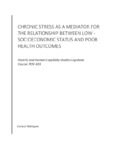| dc.rights.license | In Copyright | en_US |
| dc.creator | Rodriguez, Carissa Lynn | |
| dc.date.accessioned | 2021-06-30T10:42:50Z | |
| dc.date.available | 2021-06-30T10:42:50Z | |
| dc.date.created | 2021 | |
| dc.identifier | WLURG38_Rodriguez_POV_2021 | |
| dc.identifier.uri | http://hdl.handle.net/11021/35399 | |
| dc.description | Capstone; [FULL-TEXT FREELY AVAILABLE FOLLOWING A 5-YEAR EMBARGO] | en_US |
| dc.description | Carissa Lynn Rodriguez is a member of the Class of 2020 of Washington and Lee University. | en_US |
| dc.description.abstract | The state of American health is alarming. How do we spend so much money even though a large number of us are in poor health and lack access to proper care? My paper will examine the root of this problem. It is important to investigate poverty's role in later life outcomes for several reasons. First, there is a socioeconomic status-health gradient, with each step down the ladder associated with poorer health outcomes and risk of physical disease. This can be attributed to the fact that many things like housing conditions, educational quality, and neighborhood environment are a function of our socioeconomic status. Secondly, low socioeconomic status is associated with more stressors such as job insecurity, inadequate childcare, exposure to violence, lack of social engagement, food insecurity, and so on. Third, there is much data to support the evidence for a connection between poverty and chronic diseases like obesity, cancer, and heart disease. To address this disparity, I will investigate the relationship between low socioeconomic status and health. I propose that this issue can be guided by looking at the social determinants that shape our health outcomes. I will focus on stress levels in environments where children develop and grow. Stress is known to affect brain development and structure in children. Therefore, I will analyze how chronic stress can serve as a mediator between low socioeconomic status and health outcomes. [From introductory section] | en_US |
| dc.description.statementofresponsibility | Carissa Rodriguez | |
| dc.format.extent | 40 pages | en_US |
| dc.language.iso | en_US | en_US |
| dc.rights | This material is made available for use in research, teaching, and private study, pursuant to U.S. Copyright law. The user assumes full responsibility for any use of the materials, including but not limited to, infringement of copyright and publication rights of reproduced materials. Any materials used should be fully credited with the source. | en_US |
| dc.rights.uri | http://rightsstatements.org/vocab/InC/1.0/ | en_US |
| dc.subject.other | Washington and Lee University, Shepherd Poverty Program | en_US |
| dc.title | Chronic Stress as a Mediator for the Relationship Between Low-Socioeconomic Status and Poor Health Outcomes | en_US |
| dc.type | Text | en_US |
| dcterms.isPartOf | RG38 - Student Papers | |
| dc.rights.holder | Rodriguez, Carissa Lynn | |
| dc.subject.fast | Public health | en_US |
| dc.subject.fast | Poverty | en_US |
| dc.subject.fast | Stress (Psychology) | en_US |
| dc.subject.fast | Social status | en_US |
| local.department | Shepherd Poverty Program | en_US |
| local.scholarshiptype | Capstone | en_US |
